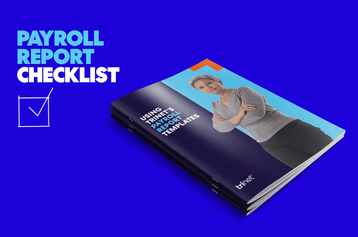
California is famously proactive with its employment laws. From the controversial (and recently revised) AB5 law to its recently amended “Kin Care” law, the state is constantly fine-tuning and introducing legislation intended to protect employees and improve their lives in the workplace. This is good for you, the California-based HR manager, to know and keep in mind as you work with your employees. Despite its frequently changing laws, though, California usually ranks high among the most employee-friendly states. When we say high, we are talking top-3 high. In 2020, Oxfam ranked California at #1 in its “Best and Worst States to Work in America” index. The website ranked every state using 3 categories: wage policies, worker protection, and right to organize.
Taking a closer look at California's employment laws
But let's circle back to the “Kin Care” law we mentioned earlier. It is important because it opens up a broader discussion about California's employment laws. According to Employers.org, California employment laws are strictly enforced by a whopping 6 separate regulatory agencies. Put into perspective, almost every other state does not even have half that many regulatory agencies enforcing employment laws. Most max out at 1 or 2. So with that data in mind, it is easy to see why California has a reputation for holding employers accountable and protecting employees from unfair treatment. Because of the state's steadfast commitment to amending unfair laws fast, there is so much to know and so much that changes that it can all begin to feel very overwhelming. Don't worry, though. The best thing you can do is stay informed and stay compliant. But before we get too much further into the nitty-gritty, you may be wondering: What is California's “Kin Care” law? Why is it relevant? These are great questions and we will cover all that and more in the guide below.
What does California's "Kin Care" law mean for employers?
Essentially, California's “Kin Care” law allows employees to use up to half of their annual sick leave to care for ailing family members. As an HR manager (particularly if you are based in California), it is important that you are aware of this law. This is also vital information if your organization is looking to expand into California. Make sure that employees are aware of their rights and that employers remain mindful of the parameters of this law.
The Kin Care law, like many of California's other laws, has recently undergone some revisions. In September 2020, California governor Gavin Newsom amended the state's “Kin Care” law so that employees, not employers, could determine whether or not their health-related absences get designated as kin care or just sick leave. This would help keep family health matters private and protect employees from unfair disciplinary action.
How California's Kin Care law defines “family”
It is important to know how the state of California defines “family.” It may seem self-explanatory but we would rather be clear than leave any of this up to your imagination. Under California law, family is defined as:
- One's child, whether it be a biological child, an adopted child, foster child, stepchild, or legal ward
- One's parent, whether it be a biological parent, foster parent, adoptive parent, legal guardian, or stepparent
- A sibling
- A spouse
- A grandparent
- A grandchild
- A registered domestic partner
In other words, your old high school buddy who gets sick while crashing on your couch likely will not qualify as family. “Family” does not have to be someone you are related to by blood, but if they are not, they do need to be a person who is under your care. It is important to know how California law defines this because it will help employees determine whether or not the “Kin Care” law applies.
Broader exploration of California employment law
From here, it is worth discussing California's employment laws on a broader level. It all gets complex pretty quickly so knowing the basics is essential. One of your biggest responsibilities as an HR professional is making sure your company is compliant with state employment laws. In California's case, this can seem like a nightmare. But that just means it is all the more important to prioritize understanding it. The consequences for slipping up or failing to comply could be costly. It is best to avoid that outcome. Let's start broad and then get a bit more specific. On a macro scale, California employment law aims to protect employees from employer retaliation and discrimination. Organizations based in California must provide their employees with equal pay, pregnancy accommodations, the option to discuss wages, etc. Among other rights the state grants employees are access to personal files and whistleblower protection. Basically, the state wants employees to have access to everything they need with little to no resistance from their employers. This serves as some compelling motivation for employers to be as transparent and fair as possible with their employees.
Other types of leave California law honors and protects
In addition to its regulations concerning kin care, California law honors and protects several other types of leave as well. Domestic violence leave, paid family leave, and emergency responder leave are 3 types of leave the state recognizes and protects. Pay is an area of employment law about which California has become very strict. For example, each late paycheck allows the affected employee to recover up to $200 (as well as a quarter of the amount the employer illegally withheld). This applies to every employee during every payroll period. All of that is to say late payments can get very expensive for employers in California. That's something to keep in mind. Also worth noting is that at the end of an employment period, employers are required to comply with applicable final pay as well as layoff notification protocols and requirements. The goal here is to make sure that employees are compensated fairly even when they are on their way out. This is consistent with the state's stringent laws on lawful, fair pay. These are just a few of the many ways in which California prioritizes the protection of its workers. The state is constantly working to further improve existing laws by amending them extensively or even replacing them with something more effective. It is an ongoing process that you must keep up with if you want to stay compliant.
California's employment laws: the takeaways for employers
As you can see, there is a lot to know about California's employment laws. We hope that this brief guide gave you the information and context you need to adjust your sick leave protocols so that your organization is compliant. We also want you to review the ways in which your organization is impacted by your state's laws, even if you are based thousands of miles away from California. It is somewhat disheartening to realize that California's commitment to employee rights is the exception rather than the rule. Hopefully, this can help set an example for the states that may not honor or protect employees as passionately and strictly as California does. The fact that California has been able to implement these laws and establish a reputation for being tough on unethical employers is impressive. The biggest takeaway here is to keep yourself and your organization informed about state employment laws and the changes that could affect your company.
This communication is for informational purposes only; it is not legal, tax or accounting advice; and is not an offer to sell, buy or procure insurance.
This post may contain hyperlinks to websites operated by parties other than TriNet. Such hyperlinks are provided for reference only. TriNet does not control such web sites and is not responsible for their content. Inclusion of such hyperlinks on TriNet.com does not necessarily imply any endorsement of the material on such websites or association with their operators.






